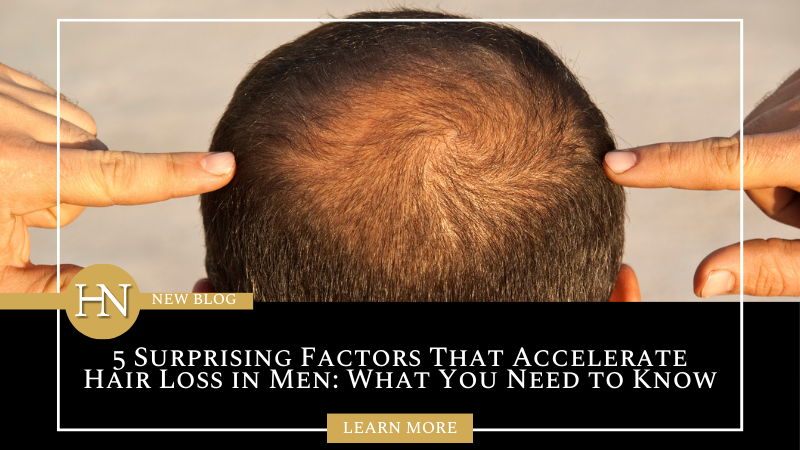5 Surprising Factors That Accelerate Hair Loss in Men: What You Need to Know

This blog delves into the lesser-known factors contributing to hair loss in men, beyond the common understanding of genetics. It highlights how stress, poor nutrition, environmental aggressors, lifestyle choices such as smoking and alcohol consumption, and certain medications can significantly impact hair health. Stress can push hair into a resting phase, while a lack of essential nutrients weakens follicles. Environmental toxins and lifestyle habits further exacerbate hair loss. Awareness and proactive management of these factors, including a balanced diet, stress reduction, and minimizing harmful exposures, are key to preserving hair health. The blog emphasizes the importance of understanding and addressing these surprising contributors to effectively manage and mitigate hair loss.
Hair loss among men is a common concern that affects many at various stages of life. While genetics play a significant role in male pattern baldness, there are several surprising factors that can accelerate hair loss. Understanding these factors is essential in taking proactive steps to manage and possibly mitigate their effects. This blog explores five unexpected contributors to hair loss in men, offering insights and advice on how to tackle this sensitive issue.
Stress: The Silent Hair Thief
Stress is a well-known culprit behind numerous health issues, including hair loss. When we're under pressure, our bodies produce excess stress hormones such as cortisol, which can lead to a condition called telogen effluvium. This condition pushes hair follicles into a resting phase, causing hair to thin and fall out more easily. Chronic stress can also trigger scalp problems, such as dandruff, further exacerbating hair loss. Managing stress through mindfulness techniques, regular exercise, and adequate rest can help mitigate its impact on your hair health.
Poor Nutrition: Starving Your Scalp
Nutrition plays a pivotal role in maintaining healthy hair. Lack of sufficient proteins, vitamins, and minerals can severely impact hair growth and quality. For instance, iron deficiency, which is relatively common in men, is linked to alopecia. Similarly, inadequate intake of vitamins D, E, and zinc can lead to weaker hair follicles and increased shedding. Ensuring a balanced diet rich in essential nutrients is crucial for not just your overall health but also for keeping your hair thick and strong.
Environmental Aggressors: Invisible Hazards
Environmental factors such as pollution, UV radiation, and harsh weather conditions can also accelerate hair loss. Pollutants can settle on the scalp and hair, leading to scalp irritation and damaging hair follicles. Similarly, excessive sun exposure can weaken hair strands, making them more prone to breakage. Protecting your hair and scalp by wearing hats, using gentle and protective hair care products, and minimizing exposure to environmental toxins can help shield your hair from these external aggressors.
Lifestyle Choices: The Impact of Vices
Lifestyle choices, including smoking and excessive alcohol consumption, have been linked to increased hair loss. Smoking reduces blood flow to the scalp, depriving hair follicles of the oxygen and nutrients needed for healthy hair growth. Alcohol, on the other hand, can lead to dehydration, affecting the strength and quality of hair. Reducing smoking and alcohol intake can significantly improve hair health, along with numerous other health benefits.
Medication and Medical Treatments: Unintended Side Effects
Certain medications and medical treatments can contribute to hair loss as an unintended side effect. For example, drugs used for blood pressure, depression, arthritis, and cancer treatment can cause hair thinning or loss. While it's essential not to discontinue any prescribed medication without consulting a doctor, being aware of this side effect allows men to discuss alternative treatments or preventive measures with their healthcare providers.
Hair loss in men can be a distressing experience, impacting self-esteem and confidence. While genetics plays a dominant role, several surprising factors can accelerate the process. Recognizing and addressing stress, nutritional deficiencies, environmental exposure, lifestyle choices, and medication effects can help manage hair loss more effectively. It's important to approach this issue with understanding and care, seeking professional advice when necessary. Remember, you're not alone in this journey, and there are steps you can take to protect and preserve your hair health.
Written on behalf of HairNation.
FAQs
Vitamins D and E, along with minerals like zinc and iron, are essential for maintaining strong and healthy hair follicles.
Yes, pollution, UV radiation, and extreme weather can damage hair follicles and strands, contributing to hair loss. Protecting your hair with hats and gentle products can help.
Inadequate intake of proteins, vitamins, and minerals like iron, vitamins D and E, and zinc can weaken hair follicles, leading to increased hair shedding and loss.
Restorative Hair Transformation Starts Here
Hair loss is not something you have to accept. Effective and lasting solutions for hair loss for men and women are available. Through a comprehensive consultation, HairNation delivers accurate and insightful diagnosis and advanced hair restoration treatment strategies to guide you on your journey to complete and transformative hair restoration.
“Contact us today by completing the form below or calling us at 1 (587) 952-8844. Complimentary in-person consultations are available for clients in Calgary and the surrounding area, while complimentary virtual consultations are offered for those located outside the region.”


